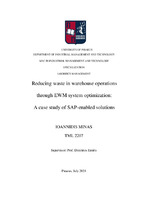Reducing waste in warehouse operations through EWM system optimization: a case study of SAP-enabled solutions
Μείωση της απόρριψης αποβλήτων στις λειτουργίες αποθήκης μέσω της βελτιστοποίησης του συστήματος EWM: μελέτη περίπτωσης λύσεων υποστηριζόμενων από το SAP

Master Thesis
Συγγραφέας
Ιωαννίδης, Μηνάς
Ioannidis, Minas
Ημερομηνία
2024-07-23Επιβλέπων
Εμίρης, ΔημήτριοςEmiris, Dimitrios
Προβολή/
Λέξεις κλειδιά
Environmental awareness ; Sustainability ; Waste reduction ; Waste ; Operational efficiency ; SAP ; ERP ; SAP EWM ; SAP S/ 4HANA ; Implementation ; Warehouse ; Optimization ; Inventory management ; Real-Time visibility ; Cost savings ; Stock minimization ; Waste identification ; Obsolete stock ; Material handling ; Streamlined processes ; Workflows ; Inventory monitoring ; Machine oil wastage ; Integrated technology systems ; Ecological footprint ; Sustainable future ; Electricity distribution ; Power transmission operator ; Electricity ; Electronic waste management ; Waste management strategy ; Process optimization ; Electronic waste handling ; F-GASES ; Hazardous waste ; Non-hazardous waste ; Extended warehouse management ; Waste management ; Waste collectors ; Responsibility ; SAP tools ; Waste associate contractor ; Collection order ; Waste collection contract ; Waste material ; Waste identification form ; Hazardous waste identification form ; SF6 ; EWC ; ODS ; Platform ; Classification ; Projected waste production ; Waste analysis ; Waste forecasting analysis ; Key performance indicators ; KPIs ; Environmental concerns ; SAP solutionΠερίληψη
Στη σημερινή εποχή των αυξανόμενων περιβαλλοντικών ανησυχιών και της αυξανόμε-
νης εστίασης στη βιωσιμότητα, οι οργανισμοί σε όλους τους κλάδους προσπαθούν να
μειώσουν τα απόβλητα και να βελτιώσουν την αποδοτικότητα των λειτουργιών τους. Η
παρούσα μελέτη διερευνά τα πιθανά οφέλη από την εφαρμογή του λογισμικού SAP Ex-
tended Warehouse Management (EWM) για τον εξορθολογισμό και τη βελτιστοποίηση
των διαδικασιών αποθήκευσης, ως αποτέλεσμα τη μείωση των αποβλήτων. Αξιοποιώ-
ντας τις προηγμένες λειτουργίες του SAP EWM, όπως η διαχείριση αποθεμάτων, η βελ-
τιστοποίηση της εκτέλεσης παραγγελιών και η ορατότητα σε πραγματικό χρόνο, οι ορ-
γανισμοί μπορούν να εξαλείψουν αποτελεσματικά το περιττό κόστος διατήρησης αποθε-
μάτων, να ελαχιστοποιήσουν τα αποθέματα και να βελτιώσουν τη συνολική παραγωγι-
κότητα της αποθήκης. Η παρούσα έρευνα εξετάζει τις βασικές λειτουργίες του SAP
EWM που μπορούν να αξιοποιηθούν για τον εντοπισμό και την αντιμετώπιση διαφόρων
τύπων αποβλήτων, συμπεριλαμβανομένων των υπερβολικών αποθεμάτων, των απαρ-
χαιωμένων αποθεμάτων, της αναποτελεσματικότητας του χειρισμού υλικών και των λει-
τουργικών συμφορήσεων. Πιο συγκεκριμένα, η παρούσα μελέτη διερευνά τον τρόπο με
τον οποίο το SAP EWM, μια ολοκληρωμένη λύση διαχείρισης αποθηκών, μπορεί να
βοηθήσει στον εξορθολογισμό των διαδικασιών και στην παρακολούθηση των επιπέδων
αποθεμάτων για την ελαχιστοποίηση της σπατάλης του μηχανέλαιου στις αποθήκες. Η
σημασία των ολοκληρωμένων τεχνολογικών συστημάτων για την επίτευξη των στόχων
μείωσης της σπατάλης, τονίζοντας τα πιθανά οφέλη από τη χρήση του SAP EWM στις
εργασίες αποθήκης, τονίζεται επίσης σε αυτή την έρευνα. Αγκαλιάζοντας το SAP EWM
ως ένα ισχυρό εργαλείο για τη μείωση των αποβλήτων, οι οργανισμοί μπορούν να βελ-
τιώσουν σημαντικά τις λειτουργίες των αποθηκών, να μειώσουν το οικολογικό αποτύ-
πωμα και να συμβάλουν σε ένα βιώσιμο μέλλον. Τέλος, στην παρούσα μελέτη εξετάζεται
ένας οργανισμός που είναι υπεύθυνος για τη διανομή ηλεκτρικής ενέργειας με ιδιαίτερη
έμφαση στη διαχείριση των ηλεκτρονικών αποβλήτων. Επιπλέον, διερευνά την εφαρ-
μογή του SAP EWM για τη βελτίωση της χωρικής και ποσοτικής διαχείρισης των απο-
βλήτων. Η έρευνα επιδιώκει να κατανοήσει την αλληλεπίδραση αυτών των συστημάτων
και τη συμβολή τους σε μια αποτελεσματικότερη στρατηγική διαχείρισης αποβλήτων,
βελτιστοποιώντας έτσι τις διαδικασίες τόσο στη διανομή ηλεκτρικής ενέργειας όσο και
στη διαχείριση ηλεκτρονικών αποβλήτων.


